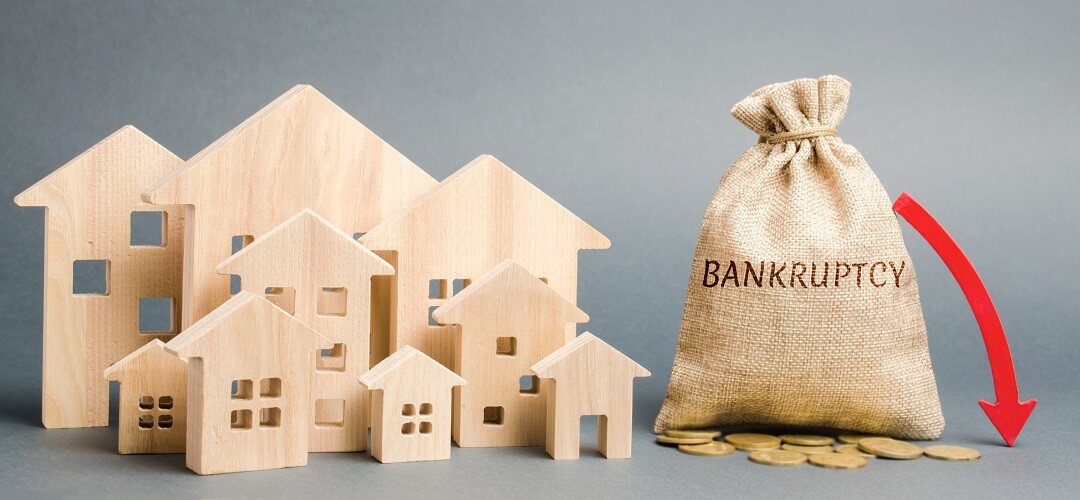After going through bankruptcy, it may feel like you will never get yourself back on track, and purchasing a home is definitely out of the question. However, the fact is that it is possible to bounce back from bankruptcy and even qualify for a home mortgage if you follow the necessary steps.
Here we will take a look at these necessary steps and how you can work your way into the home of your dreams.
Key takeaways
- Understand the different types of bankruptcy.
- Learn how the different types of bankruptcy affect your ability to get a mortgage.
- Explore the necessary steps to move past your bankruptcy and qualify for a mortgage.
What is bankruptcy?
Bankruptcy is a legal proceeding through the federal courts and is outlined in the U.S. Bankruptcy Code. A bankruptcy is initiated when individuals or businesses are unable to pay their current outstanding debts and obligations. The process evaluates the debtor’s assets and, in some cases, uses the assets to repay some of the outstanding debts. While assets may pay down some of the outstanding debt, other bankruptcy options will arrange for debt repayment with lower payment plans. The idea behind bankruptcy is to offer a fresh start for the debtor. There are six different types of bankruptcy available to individuals and businesses, but here we will focus on the two most common bankruptcy options commonly used by consumers.
Chapter 7 Bankruptcy
The most common consumer bankruptcy is Chapter 7. This form of bankruptcy is most often used when a consumer does not have the financial resources available to repay their debt. When you file a Chapter 7 bankruptcy, you may be required to sell off much of your existing assets in order to provide some sort of repayment to your creditors, especially if you have secured debt. The assets you are allowed to keep will depend on your state’s laws. Because a Chapter 7 bankruptcy filing forgives the major portion of your established debt, effectively releasing you from the responsibility of all dischargeable debt, your credit score will suffer a dramatic hit.
Chapter 13 Bankruptcy
Chapter 13 bankruptcy is for consumers with a steady income that is looking to repay their debt but under different circumstances. This type of bankruptcy reorganizes your existing debt, creating a payment plan spread out over three to five years. After completing the repayment plan, the debts are discharged. This bankruptcy option allows you to keep your current assets.
Why it can be challenging to get a mortgage after bankruptcy?
While bankruptcy eliminates or adjusts your debt, it isn’t without a price. A bankruptcy will significantly lower your credit score reflected on your credit report and will continue to impact your credit for some time. A Chapter 7 bankruptcy remains on your report for up to 10 years, while Chapter 13 remains for up to seven years. While this makes you a lending risk for creditors and mortgage lenders, you do not need to wait seven to 10 years before you can consider buying a home, but you will need to be patient. Many lenders have requirements when it comes to mortgages and bankruptcy, and this includes a waiting period that can be anywhere from one to four years after your bankruptcy discharge.
How to get a mortgage after bankruptcy
While it is very possible to get a mortgage after bankruptcy, it will take time and effort on your part. Most lenders and loan types require a waiting period before you are eligible to apply for a mortgage. In addition, many require a minimum credit score for qualification, so it is essential to focus on reestablishing your credit by making monthly payments on time and keeping a low balance on any revolving credit card accounts. Here we take a closer look at loan types and their requirements after bankruptcy.
1. Conventional Loans
Conventional loans are the most common mortgage loan type in the United States. Conforming conventional loans follow the lending guidelines set by Fannie Mae and Freddie Mac, while non-conforming conventional loans, known as jumbo loans, do not follow the same guidelines as they allow for larger loans that exceed lending guidelines.
Features
Conventional loans can have either fixed or adjustable interest rates and terms that go from 10 to 30 years. With a conventional loan, your down payment can be as low as 3%.
Advantages and disadvantages
- Offered by most lenders
- Wide range of terms
- Can stop PMI once you have 22% home equity
- Requires higher credit score
- Can be more difficult to qualify after a bankruptcy
Requirements
Getting approved for a conventional loan after bankruptcy requires borrowers to meet certain requirements that include:
- Two to four-year waiting period based on bankruptcy type
- 620 minimum credit score
- Down payment of at least 3%
2. FHA Loans
FHA loans are government-backed by the Federal Housing Administration which means that lenders can feel more comfortable when taking on risky borrowers. Because of this, loan requirements are often more lenient.
Features
FHA loans are available with both fixed or adjustable interest rate options and extend a loan term of 15 to 30 years. Down payments as low as 3.5% are also available based on your overall credit score.
Advantages and disadvantages
- Low down payment
- More lenient requirements
- Better interest rates
- Mortgage insurance premiums required for the life of the loan
- Lower loan maximums
Requirements
In order for borrowers to consider an FHA loan after bankruptcy, there are some specific requirements they must meet first:
- One- to two-year waiting period
- Permission from the bankruptcy court to secure a mortgage (Chapter 13)
- 580 minimum credit score, though this can down as low as 500 with a higher down payment
- 3.5% minimum down payment or 10% down payment with a lower credit score
3. USDA Loans
USDA loans are backed by the U.S. Department of Agriculture and are available for borrowers looking to purchase a home in qualifying rural areas across the United States.
Features
USDA loans offer only fixed-rate mortgages with a 30-year term. In addition to meeting the home requirements, borrowers cannot have income that exceeds 115% of the median income in their area.
Advantages and disadvantages
- No down payment
- Low-interest rates
- Low origination fees
- Geographical requirements
- Income limits
- Primary residence requirements
Requirements
In order to qualify for a USDA loan after a bankruptcy, borrows must first meet additional requirements that include:
- Two- to three-year waiting period
- While no minimum credit score is required by the USDA, most lenders look for a score of 640 or above
4. VA Loans
VA loans are backed by the U.S. Department of Veterans Affairs and are available only to veterans, active-duty military, and surviving spouses.
Features
In general, VA loans are often more lenient when it comes to loan qualifications and do not require a minimum down payment. However, you must meet the specific Armed Forces requirements in order to receive a Certificate of Eligibility and be considered eligible.
Advantages and disadvantages
No down payment is required
No mortgage insurance
Lower interest rates
Home appraisal and inspection are required
Requirements
VA loans are known to be more lenient when it comes to a borrower’s credit history, and this includes bankruptcy. However, you will still need to meet certain requirements after bankruptcy.
- One- to two-year waiting period
- While there is no required minimum credit score, many lenders require a score above 620
5. Non-Qualified Mortgage
A non-qualified mortgage is a loan option that doesn’t meet the typical standards associated with a conventional mortgage. These types of mortgages often have risky features, such as interest-only payments and longer loan terms. They can be more expensive and riskier for borrowers, but they offer more lenient requirements
Features
Non-qualified mortgages can help those that do not qualify for other, more traditional mortgage options and have unusual financial situations and questionable credit histories. However, this leniency often comes with a more expensive price tag, including higher monthly mortgage payments.
Advantages and disadvantages
- Can help borrowers qualify when other options turn them down
- Can use bank statements to prove income
- Possible to get approved after bankruptcy without a waiting period
- Offers flexible terms
- High-interest rates
- May require a large down payment
- Not widely available
Requirements
Receiving approval on a non-qualified mortgage after bankruptcy often does not require any waiting period and credit score and down payment requirements will vary by lender.
How long after bankruptcy can you buy a house?
| Type of Loan | Chapter 7 | Chapter 13 |
|---|---|---|
| Conventional | 4 years | 2 years from the discharge date |
| FHA | 2 years | 1 year |
| USDA | 3 years | 1 year |
| VA | 2 years | 1 year |
| Non-Qualified Mortgage | No minimum waiting period | No minimum waiting period |
Previous bankruptcy doesn’t mean you can’t buy your dream home
While bankruptcy does not mean you will never be approved for a mortgage, you will need to be patient and work to reestablish your credit before applying for any mortgage type. While rebuilding your credit, it is important that you apply for new credit cautiously and use your waiting period to increase your credit score, thus helping to increase your chances of a mortgage loan approval.
Hero Home Loans can help you navigate the process
While filing for bankruptcy can be a relief when it comes to releasing debt you are unable to afford and providing a new start, that new start does not begin right away. When it comes to purchasing a new home, the waiting period may seem like an eternity. At Hero Home Loans, we understand that life happens and that you want to make the most of your fresh start. Our goal is to help our everyday heroes move into their dream homes and attain home ownership and our team is here to help you navigate the home loan process after bankruptcy. To learn more about how we can help, schedule a call with us today.












